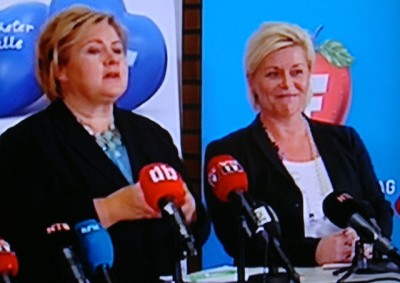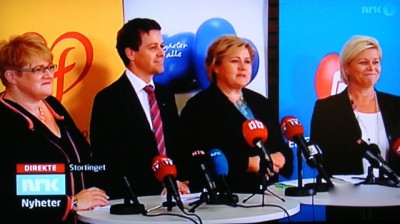Conservative Party leader Erna Solberg and Progress Party leader Siv Jensen will launch negotiations this week to form a government on their own for the first time ever. They called it an “historic” event, since they’ll also have the support on several issues from the country‘s two other non-socialist parties, the Liberals and the Christian Democrats.

After marathon negotiations since the non-socialists beat out the current left-center coalition in the September 9 election, the four parties decided not to form a government together. They signed an agreement, however, that assures majority support in Parliament on some major issues.
The Conservatives and the Progress Party extracted agreements, for example, to cut government bureaucracy, trim if not downright cut taxes, and gain support for new ways of building better roads in Norway, among other things.
At the same time, they went along with their junior partners’ wishes to halt plans for any serious studies of the consequences of oil exploration and drilling off scenic Lofoten and Vesterålen, as well as in other key areas in the Arctic.
“Yes, that’s painful (for the Progress Party),” Jensen replied in answer to a question at a press conference Monday night about how she’ll be able to explain that compromise to constituents in Northern Norway eager for the economic development that oil and gas exploration can bring. “But it all had to do with the total picture. It was a balance,” Jensen added, after explaining that her party “understands that we must give in order to get.”

The Progress Party actually seemed to be doing more giving than taking in its zest to finally secure government power. Details remained sketchy Monday night, but Jensen will need to tone down her eagerness to invest more of Norway’s oil wealth in Norway. A 4 percent cap on spending from the oil fund will be maintained, while a form of amnesty will be offered to the children of asylum seekers born in Norway as well.
Knut Arild Hareide of the Christian Democrats said he felt he’d gained more influence for his party in the past two weeks of talks with the Conservatives, the Progress Party and the Liberals than he’d had in the past eight years in opposition in Parliament. Jensen defended her party’s compromises, insisting that “we have always said we will have responsible economic policies.”
Hareide admitted, for all his breakthroughs in the negotiations, that the Conservatives’ voter support is five times that of his party’s, and the Progress Party’s voter support is more than three times bigger. It was, in the end, correct for the two biggest non-socialist parties to form a government, with support and influence from his party and the Liberals.
Opting for ‘Parliament as a platform’
So why not, then, go along with a four-party coalition? “We decided we want to use the Parliament as our platform” Grande said. “We have had open and good discussions, but it was important that it be a two-part government.”
Solberg, who had worked towards a four-party solution for months, said the parties were “very close” to forming a coalition, and even though it didn’t happen, “we came farther than most could expect.” She and Jensen have promised to consult Hareide and Grande first on various proposals, and can often count on their votes to win a majority.
“I think the parties are much closer now,” Jensen said. “We had incredibly good and constructive talks, and I think what we’ve now agreed on is very good.”
The agreement they all signed publicly on national TV Monday night secures the Christian Democrats and the Liberals influence in the government without actually being part of it. They all thanked one another for what they called “genuine cooperation,” and believe they have laid the groundwork for a stable, Conservatives-led government that will have Erna Solberg as prime minister. On some issues, though, the government might actually instead get the support of Labour in opposition, like on market liberalization or agricultural reform. Those were areas where the Christian Democrats were far apart from the Conservatives and Progress parties.
It’s now left to Solberg and Jensen, tipped to be finance minister, and their respective party fellows to hammer out a government platform and agree on how to divide the ministries amongst themselves before they all meet King Harald V on Friday October 18. More intense negotiations will begin on Tuesday.
newsinenglish.no/Nina Berglund

